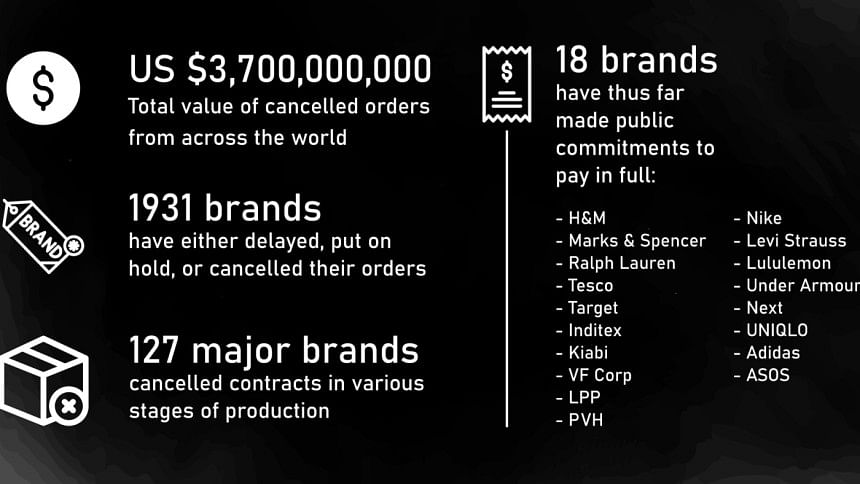
Zyma Islam | Sushmita S Preetha
This story was originally published in the print edition of The Daily Star on June 26, 2020. The data was collected by the Bangladesh Garments Manufacturers and Exporters Association (BGMEA) through a survey of factories -- The Daily Star could not independently verify every claim that was made. We've planned to make the dataset dynamic, updating it with authentic feedback of buyers and suppliers. Major brands are requested to provide details of orders cancelled or put on hold with names of their Bangladeshi suppliers -- we will update the story and dataset following due diligence. Please email your details to [email protected] with the subject line "RMG order data".
You may have already seen the social media campaign '#payup' and the Facebook posts asking Kardashian sisters Kendall and Kylie Jenner to pay up their suppliers in Bangladesh. You may have also read about the British brand, Debenhams, which is asking for a whopping 90 per cent discount on products from 40 suppliers in the country.
What you may not know is that these are only two of at least 1931 brands which have either delayed, put on hold, or straight-up cancelled their orders since the onset of Covid-19, as per data received from the Bangladesh Garment Manufacturers and Exporters Association (BGMEA).
The total value of these orders is around $3.7 billion. This includes everyone -- high street fashion brands, purse-friendly chain-stores and faceless buying houses.
The data was submitted by individual factories to the BGMEA as the pandemic intensified and cancellations started to happen, and The Daily Star received a copy in mid-May. Factories reported details of orders that were either straight-up cancelled, or put on hold until later date. The data was then cleaned for duplicate entries and incomplete data to calculate the estimates presented in this report.

Graphic: Shaer Reaz | Source: BGMEA data
About 470 of the buyers are from the US and approximately 280 others from the UK. Italy and Canada follow closely with approximately 180 and 170 buyers fully or partially cancelling or putting their orders on hold. Fifth and sixth in line are Germany and France, with approximately 150 and 140 buyers.
At least 127 major brands cancelled contracts in various stages of production -- sometimes turning away finished products lying at the port -- or reneged on promised contracts. An overwhelming majority are asking for massive discounts for products already produced or delaying payments by six months to a year, or worse, indefinitely.
The brands which cancelled or postponed the highest volume of orders were: Primark, H&M, C&A, Marks & Spencer and Tesco.
Of the top 50 brands which reported the most cancellations/postponements from Bangladesh, only 10 have thus far made public commitments to pay in full for orders completed and in production, according to Worker Rights Consortium, an international labour rights monitoring body. These brands are: H&M, Marks & Spencer, Tesco, Kiabi, VF, LPP, PVH, Inditex, Target and Ralph Lauren.
Four more brands, namely Bestseller, C&A, Primark and Walmart, have made vague promises to take back cancelled goods, but have not specified when they would do so, and more importantly, when and what percentage of the original cost suppliers would be paid.
BGMEA president Rubana Huq said that as of May 20, these brands had reinstated up to 58 percent of their initial cancellation.
However, even for reinstated orders, brands are not taking them immediately, added Huq.
"The goods supposed to be shipped in March, 2020 are getting delayed and suppliers have to bear with the stockpiling. This is eventually increasing the costs of the product, while the payment is remaining same or even less," she said.
Meanwhile, despite stores opening up selectively in Europe and North America, buyers have continued to demand massive discounts, delay payments or ask suppliers to store products till the next season, incurring additional costs, as per in-depth interviews with suppliers sourcing for 20 major brands.

Graphic: Shaer Reaz | Source: BGMEA data
Orders held, delayed payments and discounts
While a number of influential global brands have made public commitments not to cancel orders outright, there's no clarity on their position regarding orders which are on hold -- if and when they will be taken, and more importantly, when payments will be cleared.
"Order cancellation is only one of our headaches. Many brands say that they will take the orders, but at a later date, maybe in three months, six months or even a year," said Nafis Ud Doula, director, Impress-Newtex Composite Textiles, which had cancellations as well as postponements from Bestseller and C&A, among others.
"Meanwhile, we also have to deal with delayed payment, even for products we have already sent over, they are saying we'll pay four to eight months later. For orders that are on hold, it's so uncertain when, if ever, we'll be paid."
Polish brand LPP, Spanish brand Springfield and French brand Tape O' Loeil put contracts on hold with Torque Fashions, informed its managing director Kazi Hoque.
"Springfield cancelled 2,66,000 pieces worth $1.6 million. They said that they will take the goods next season, but we do not for sure know whether they will take it. We have to wait for a further four orders," he said. The brand belongs to Tendam Group, which owns around 2000 stores in 79 countries.
According to BGMEA data, the brand has cancelled or postponed $4.2 million worth of goods.
"The goods are ready, the goods are at port, but they told us, that if we send it now, they will not be able to catch the season. There were some orders that we had already sent to the Chattogram port, that we had to bring back to Dhaka," he said.
"They had initially even wanted to return the orders that had already reached Spain, but we said that our country's rules would make that impossible. It is better to cancel the orders," he added.
"These are all denim products. We are not prepared to store the goods for the next four or six months in our warehouses…if they are to be kept for the next season, they have to be kept in a humidity and temperature-controlled environment.
"Our warehouse is not like that. My prediction is if the quality falls they will ask for a discount," he feared.
Hoque has reason to worry because another buyer Terranova is already doing so. While the brand is taking all their orders, they are unwilling to accommodate the lockdown.
He has already sent goods worth $833,724 between mid-May till mid-June, but delays have ranged from 10 days to 40 days, and he is having to give Terranova a $236,890 discount.
Hoque wanted 45 days of extension to make his factories safe for his workers before opening but Terranova refused.
"They said they need the goods, so they will neither give an extension nor cancel. According to the terms of the LC, there is a clause that says if we delay sending the products, it allows the buyers to claim a discount," he explained.
"Demanding discounts for the obvious lockdown period is a selfish thing to do. What will the brands or the suppliers do in a crisis of manpower? So, demanding discounts must be stopped as both the brands and the suppliers were in the same situation during the lockdown period.
"We urge the brands to look at the situation here with empathy, for sustaining the business," said BGMEA President Rubana Huq.
To view details of each brand that cancelled orders, click on "Details" below the brand's logo. To go to the next or previous brand, click on the right or left arrows.
[SLIDER]
Future orders
Suppliers are now also worried about future orders -- and their fears are not unfounded. All the brands we reached out to admitted that there would likely be some reduction in future orders, given the depressed state of the market and unsold stocks of products from this season.
"I don't know what will happen in July. The number of orders we need will not come. The business will not be stable until March 2021," Shamsuddin claimed.
On this point, he and his buyer, Bestseller, are on the same page.
"We are placing orders for autumn, although a reduction in some volumes is sought to prevent over-production," said Bestseller.
"The projection we are looking at is alarming. It's less than 50 per cent of what our usual orders are. For example, usually, we do 1 million pieces a month for H&M, now we are getting orders worth 4 lakh, 4.5 lakh.
"At this rate, it's difficult to guarantee how many of our suppliers will make it through the year without going bankrupt or downsizing significantly," said Sharif Zahir.
When asked if they would help pay for the costs of furloughing workers brought about by reductions of orders, none of the brands said they would assist the manufacturers directly.

Some, including H&M, Inditex, Primark, Bestseller, pointed us towards the ILO-Call to action which they have signed, which commits them to work with governments and financial institutions to mobilise sufficient funding to keep manufacturers in the business including payment of wages, as well as income-support and job-retention schemes to address the impact of the crisis.
However, it does not obligate the signatory brands to commit to any payment themselves.
"The Call to Action is a non-binding document. Its main value is that it gets brands and retailers to sign and declare that they will pay for their orders.
"But the question remains, what happens beyond that to secure some of the commitments," Scott Nova said. "We are trying to make sure supply chain workers are included in the rescue packages being mobilised."
It is also unclear whether the funding being brought from financial institutions would come as loans, and if so, which party would pay the interest. Again, none of the brands provided a clear answer to this question.
"We think that all brands are trying to regain normalcy. We know that they are coming forward but getting the flow of order, shipment and payment back to normal will ultimately help both the brand and suppliers minimize losses in the long run," said Rubana Huq.

